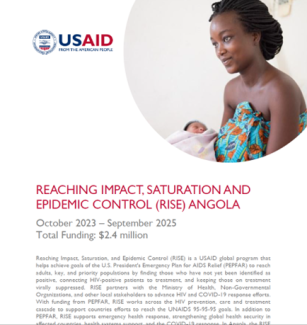Duration: October 2023 – September 2025
Total Funding: $2.4 million
OVERVIEW
Reaching Impact, Saturation, and Epidemic Control (RISE) is a USAID global program that helps achieve goals of the U.S. President's Emergency Plan for AIDS Relief (PEPFAR) to reach adults, key, and priority populations by finding those who have not yet been identified as positive, connecting HIV-positive patients to treatment, and keeping those on treatment virally suppressed. RISE partners with the Ministry of Health, Non-Governmental Organizations, and other local stakeholders to advance HIV and COVID-19 response efforts. With funding from PEPFAR, RISE works across the HIV prevention, care and treatment cascade to support countries efforts to reach the UNAIDS 95-95-95 goals. In addition to PEPFAR, RISE supports emergency health response, strengthening global health security in affected countries, health systems support, and the COVID-19 response. In Angola, the RISE project was launched in October 2023 and will support the Government of the Republic of Angola to strengthen an integrated approach between Health facilities and facility-community to ensure effective collaboration between the various partners operating in the catchment areas of the 22 PEPFAR-supported health facilities located in the provinces of Benguela, Cunene, Huambo, and Lunda Sul.
The goal is to improve patient enrollment in care, adherence, and continuity of care by reducing interruptions in treatment and achieving viral suppression.
ACTIVITIES
- Tracing contacts of index cases and linkage of consenting clients to community counselors for home-based testing
- Screening for intimate partner violence and linkage to psychosocial support services
- Support treatment adherence, retention, and early infant diagnosis for HIV-exposed infants
- Active linkage of HIV-infected persons with health facilities for treatment
- Several innovative strategies are planned to be supported under RISE, including:
- Implementation of dried blood sample collection in the community, prioritizing first virologic test for HIV-exposed infants before two months of age,
- Establishment of community antiretroviral pick-up groups for recipients of care who are established in care,
- Identification of youth-focused civil society organizations and providing them with organizational capacity and technical skills to support young people living with HIV.
EXPECTED ACCOMPLISHMENTS
- Mentorship of a total of 88 community counselors to provide home-based HIV testing to sexual partners and biological children <19 years of age of index clients in the provinces of Benguela (34), Cunene (18), Lunda Sul (24), and Huambo (12)
- E-service peer support for clients via telephone to discuss adherence and treatment and the importance of index testing, and to receive appointment reminders
- Ongoing development of a strategy – with community counselors’ input – to reach highly vulnerable populations, such as pregnant and breastfeeding women who are not attending antenatal care, adolescent girls and young women, adolescent boys and young men, and adult men most at risk of not receiving vital HIV prevention, care, and treatment services.

